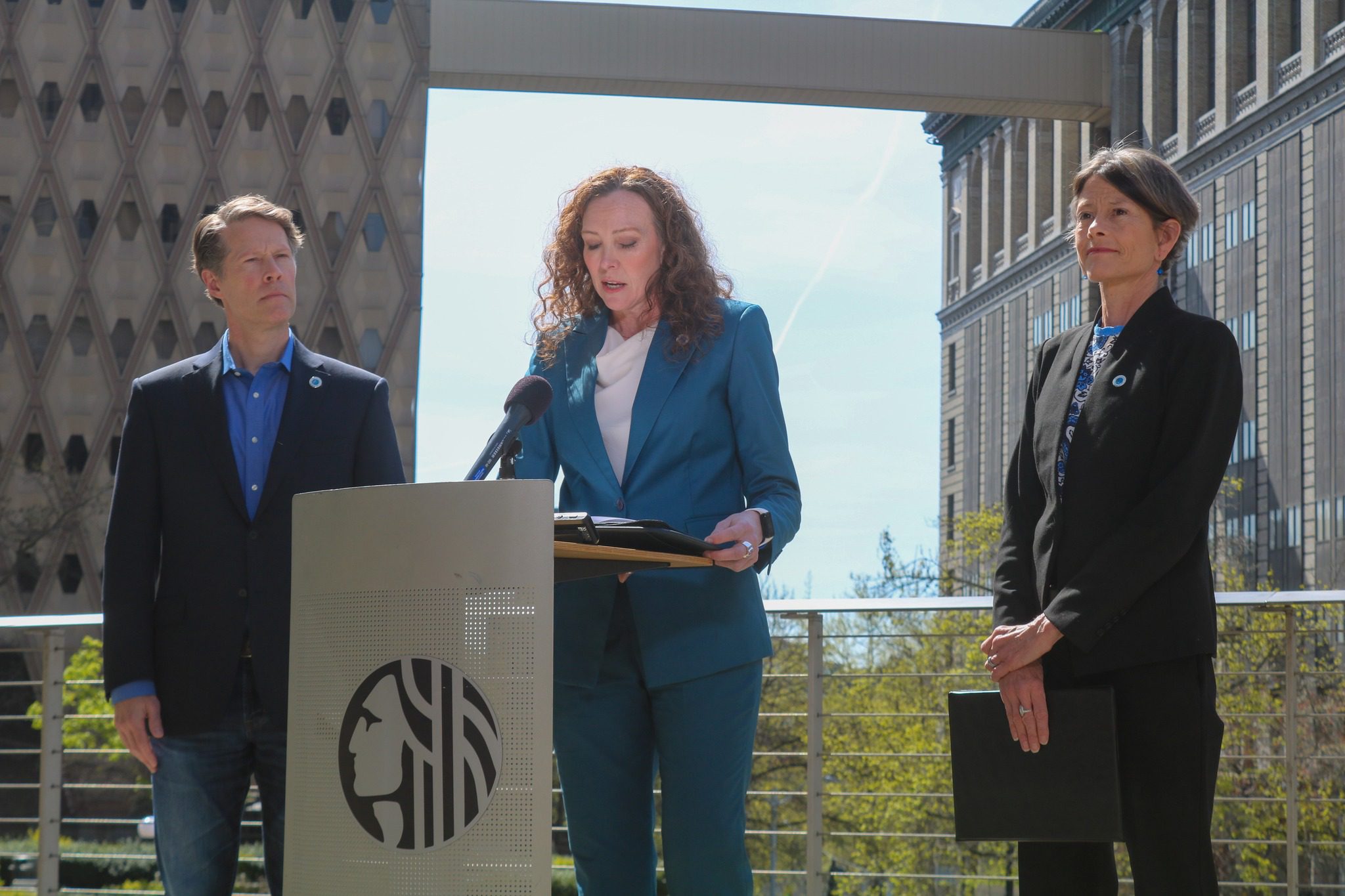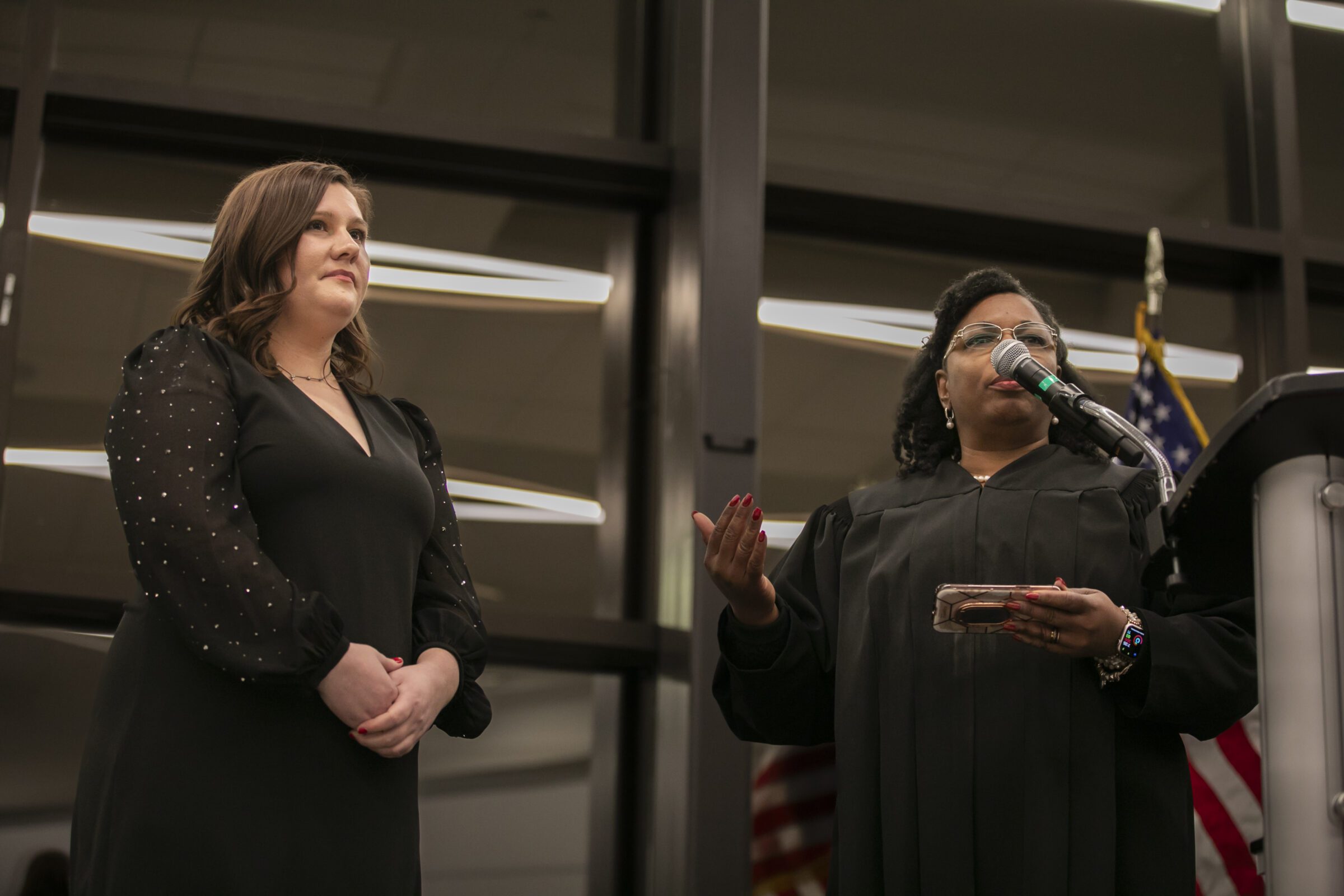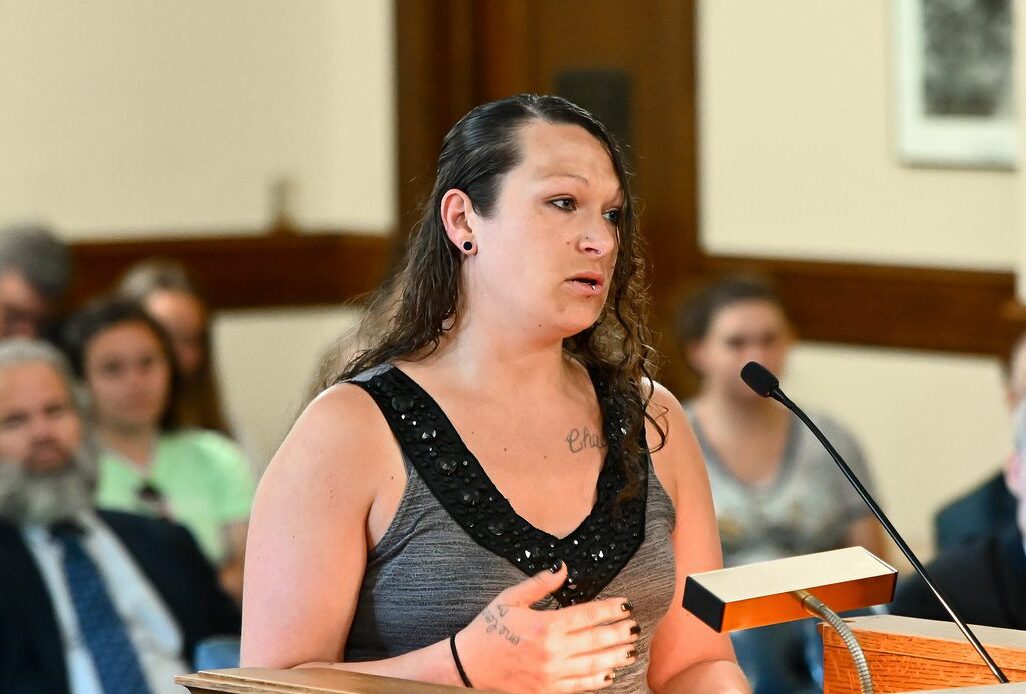City Attorney Election Puts Seattle’s Renewed ‘War on Drugs’ Under Scrutiny
Ann Davison took a punitive turn toward substance use and other low-level offenses. As she runs for reelection as Seattle city attorney, opponents propose a more progressive route.
| July 24, 2025

Editor’s note: Since this article’s original publication, incumbent Ann Davison and challenger Erika Evans advanced from the Aug. 5 primary to the general election. Evans then prevailed on Nov. 4.
Over the past year, Seattle has begun barring some residents from entering certain neighborhoods of their city.
A new ordinance has given local judges the authority to ban people from entering select zones throughout the city if they are convicted—or even just charged—with a drug-related crime while in one of the zones.
If someone under such an order is caught in a forbidden area—known as a “Stay Out of Drug Area” (SODA) zone—they can be charged with a gross misdemeanor, punishable by a $5,000 fine and up to 364 days in jail.
“It sends a message to people in crisis that they are unwelcome in our city—precisely when they most need support,” said Matt Sanders, a public defender and director of the King County Department of Public Defense.
Currently, the Lavender Rights Project, a Seattle-based organization that provides legal and social services and advocacy for the Black intersex and gender diverse community, has been talking to people affected by SODA zones over the last year. Moni Tep, the project’s director of decriminalization efforts, says the zones prevent people from going about their lives and further marginalize them.
“If people get banned from these spaces that they’re used to, they’re essentially pushed out to more unsafe places where people are not in community with them or have an understanding of their lived experience, and so that creates an even more unsafe environment,” Tep said. She and Sanders stressed that the SODA zones, which cover some central areas like the downtown core and International District where public drug use is more prevalent, may block the people subject to these orders from accessing critical services that may aid with their recovery.
The legislation creating SODA zones was presented in August of 2024 by Seattle City Attorney Ann Davison, a rare Republican in Seattle public office. Since 2022, Davison has pursued an array of policies that have cracked down on substance use, lower-level criminal offenses, and homelessness. Alongside the SODA ordinance, she supported the creation of exclusion zones for buyers and promoters of prostitution, known as Stay Out of Area of Prostitution (SOAP) zones.
“For the past two years I have heard loud and clear from law enforcement that they need new legal tools to disrupt open-air criminal drug market activity in many areas of our city and the tragedy of human trafficking on Aurora Avenue North,” Davison said in a press release at the time of passage. “I have worked on and advocated for these two new ordinances to answer that call.”
In addition to handling Seattle’s civil litigation, including defending it from lawsuits and enforcing regulations, the city attorney oversees a criminal division. But the prosecutors in that office only handle low-level crimes—misdemeanors and gross misdemeanors. (Higher-level offenses and felony charges are handled by the King County prosecuting attorney.)
In this role, Davison’s approach has been to ramp up criminal punishments in response to offenses like retail theft and substance use, pushing against criminal justice reformers who prefer treating these behaviors as public health matters.
Davison is now running for a second term as city attorney, intent on showing that her 2021 win was not a fluke. But her record has come under intense scrutiny as she faces three opponents running to her left: Erika Evans, a former prosecutor at the city attorney’s office and a former assistant U.S. Attorney; Rory O’Sullivan, a legal aid attorney who currently represents people seeking unemployment insurance benefits; and Nathan Rouse, a former litigator turned public defender.
All candidates will face off in the Aug. 5 non-partisan primary and the top two vote getters will advance to November’s general election.
(Editor’s note: Evans and Davison won the first two spots on Aug. 5, and they will face off in a two-way race in November.)
Davison’s challengers all say they want to take criminal legal policy in Seattle in a different, more progressive, direction. They say they want to move the office’s focus away from prosecuting low-level crimes of poverty, and work instead on boosting diversion and services.
In particular, all have denounced the new SODA ordinance. Each told Bolts in separate interviews that they wish to see the policy repealed, and each said they wouldn’t ask judges to issue new SODA orders.
Evans, for one, brought up the fact that Seattle enforced a similar policy in the past, roughly two decades ago, and that it resulted in racially disproportionate enforcement. Researchers also found that Seattle’s banishment zones did not reduce crime, while making it harder for those excluded from downtown areas to rebuild their lives.
“It’s really wild, crazy, and racist that our Republican city attorney did a lot of political grandstanding to think that this is a great idea, to bring something that we know is harmful and ineffective and racist back on the books,” Evans told Bolts.
During the George Floyd protests in 2020, protesters massed in Seattle’s streets for weeks on end, withstanding brutal attacks from the Seattle Police Department (SPD) while demanding that the city cut SPD’s budget and reinvest the money into community-focused programs such as participatory budgeting, non-police response to 911 calls, and affordable housing. Seven out of nine city councilmembers said in the summer of 2020 that they’d support a 50 percent cut to SPD.
No cut went into effect. Still, centrist candidates who were a lot more supportive of the police and business interests swept into office in 2021 and 2023, including Mayor Bruce Harrell and many of the council members who went on to support the SODA legislation last year by a margin of 8-1.
Davison came into office as part of that wave, in a 2021 election that played out under unusual circumstances.
In what was deemed at the time to be an upset, incumbent Pete Holmes, who was running as a moderate, didn’t make it through the primary. Instead, two highly polarized candidates grabbed the top two spots in the general election. In the left lane was Nicole Thomas-Kennedy, a former public defender and avowed abolitionist who wanted to build out alternatives to prosecution. In the right lane, Ann Davison, a Republican who had just come off an unsuccessful statewide run for lieutenant governor, argued the city wasn’t tough enough on prosecuting low-level crime.
Davison prevailed by almost four points and got to work instituting a suite of tough-on-crime policies in the city attorney’s office.
During her three-and-a-half year tenure, Davison has encouraged the city to sign a contract with an additional local jail with a high rate of fatalities. She also championed new legislation that allowed her to prosecute drug use and possession as a gross misdemeanor, a task that was already being handled by the King County Prosecutor’s Office.
And she unilaterally disbanded Seattle’s ‘community court.’ Established in the summer of 2020 in response to the protests, the court connected some people arrested over a low-level offense to services without requiring that they first plead guilty. Typically, prosecutors filed charges against a defendant but agreed to drop them if the defendant completed a program of services that may have included addiction treatment or life skills training; this allowed the defendant to avoid a criminal conviction on their record.
Seattle’s more conservative politicians accused this court of cutting people too much slack, and Davison thought they were too lax in allowing people to avoid penalties like community service.
On the campaign trail this year, Davison has proposed opening a new drug-only community court—but one that’d require that participants be subjected to, and comply with, SODA orders. This could lead the city to impose many more SODA orders.
Davison did not reply to questions about her policies for this article.
Davison told KUOW earlier this month that one of the policies she’s most proud of instituting is the High Utilizer Initiative (HUI), which focuses on a cohort of people that keep cycling through the city attorney’s office due to low-level violations like drug use. Davison told the station that too many “high utilizers” were avoiding jail time, and has credited increased jail bookings with cutting down on misdemeanor referrals to her office.
Early in her tenure, Davison got Seattle courts to agree that people on her list should not be allowed to use community court. More than 140 people on her list were booked into jail during the first year of the program, which the office called a “game changer” for the city, boasting that cracking down against those people has dramatically reduced the number of cases the police must address.
But critics say the program targets people with major behavioral issues and people who are very poor, and that the best response to these situations isn’t criminal prosecution. An analysis conducted by local publication PubliCola in 2022 showed that most people on Davison’s list labeled as “high utilizers” by her office appeared to be homeless, and many seemed to suffer from various disorders or addiction.
There have been 276 unique individuals on the list since the program’s inception in 2022.
Davison’s three challengers all told Bolts they wish to stop the HUI policy.
“Those people that are on that list need the most help,” Rouse said. “Instead of sort of fooling ourselves into thinking we can just punish our way out of this, we have to be honest and know that these cycles are not going to stop unless the root causes of these issues are addressed.”
He says he’d take the opposite approach to Davison’s. “Rather than identify this group of people for harsher treatment by the system, prioritize them for services,” he told Bolts.
The three challengers in the city attorney race are voicing broadly similar positions on many issues. They all want to more aggressively pursue wage theft and tenants’ rights cases. None of them want to seek cash bail for nonviolent misdemeanors, though they also said they’d want judges to assess if someone represents a significant risk to the public.
Each of them supported bringing back a community court, but they sounded differing notes when asked how Seattle should go about using it, and whether it should force people into treatment. Rouse was the only candidate to say he was strongly against that option.
In community courts, some people under the threat of having criminal charges filed against them could also face deportation due to the recent passage of the federal law known as the Laken Riley Act. Rouse said he sees this as a reason to try to downplay prosecutions for low-level charges like shoplifting.
Rouse said community courts should be available as a “backstop,” but that the first option the city attorney’s office should pursue should be “prefiling diversion,” which would mean connecting people to services without filing charges or threatening them with a criminal conviction.
“This is really where I think a bold city attorney can make the biggest difference,” Rouse said. “It’s really just knowing that these thousands of cases that get filed, it’s not doing anything, and really it’s causing a lot of harm, and it’s wasting a lot of money.” He added, “When community court is successful, it’s because somebody was offered some sort of service or support that met their needs, that’s why it works. It’s not because of the looming threat of prosecution or jail.”
He is especially opposed to forcing treatment programs, telling Bolts, “If someone doesn’t want treatment, then treatment is not going to work.”
O’Sullivan said he too would like to expand prefiling diversion options, but he also made the case that community courts provide for stronger accountability. He said his office would decide whether forced treatment is appropriate on a case-by-case basis.
“I’m familiar with that failure that occurs when you try to force somebody into substance abuse treatment when they’re not able or ready to receive it,” he said, but “there may be some people who are initially resistant, but have circumstances that might make it successful.”
Evans, meanwhile, praised community courts, saying she wants to hold Seattle’s in a place separate from the criminal legal system like a library, which could be built out into a resource center. On forcing people into treatment through a diversion program, she said defendants can always choose to not participate in the community court program at all, and so refuse treatment, though that could mean their prosecution continues.
The three challengers were largely on the same page, though, when it came to the harms of the SODA and SOAP ordinances, saying they want to see them repealed and to prioritize other services. “I think it’s the same thing that we need to be doing in all respects,” said O’Sullivan. “If we were doing a better job of building out housing and building out resources for the folks who are impacted by this, we’d see an improvement.”
Actually repealing the SODA and SOAP laws would require cooperation from the city council, which now leans to the right; only one council member who voted for the SODA ordinance last fall is up for reelection this year, Council President Sara Nelson.
Without a repeal, judges would still have the discretion to use SODA and SOAP orders as they deemed fit whenever the city prosecutor filed a drug-related or prostitution-related crime—or a crime with a tie to drugs or prostitution—that occurs within one of the zones.
Initially upon going into effect, the SODA legislation wasn’t being strongly enforced, with only three SODA orders issued in the first six months after passage. However, enforcement has ramped up recently; the court’s records show 23 orders have been issued in the last four months.
Tep, the Lavender Rights Project advocate, says she is concerned about this escalation, telling Bolts, “There’s no problem that’s really being solved by pushing people out of the way.”
Sign up and stay up-to-date
Support us
Bolts is a non-profit newsroom that relies on donations, and it takes resources to produce this work. If you appreciate our value, become a monthly donor or make a contribution.




